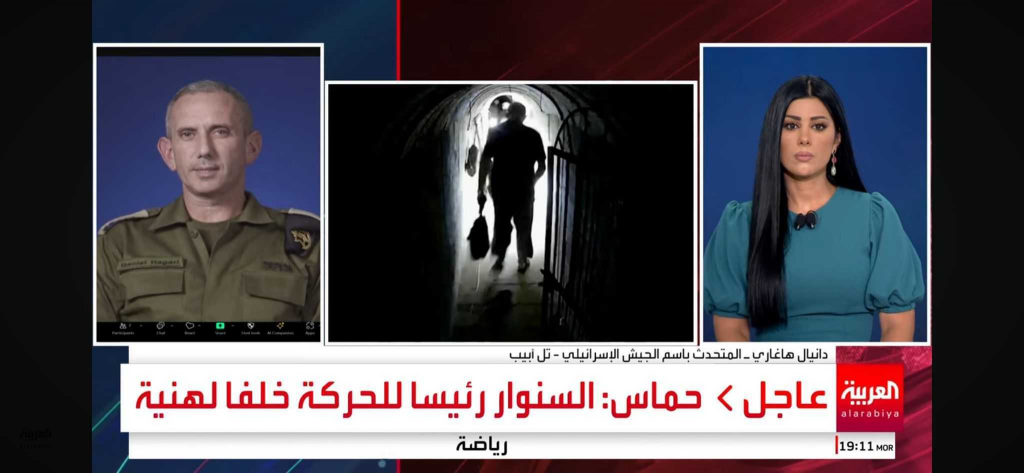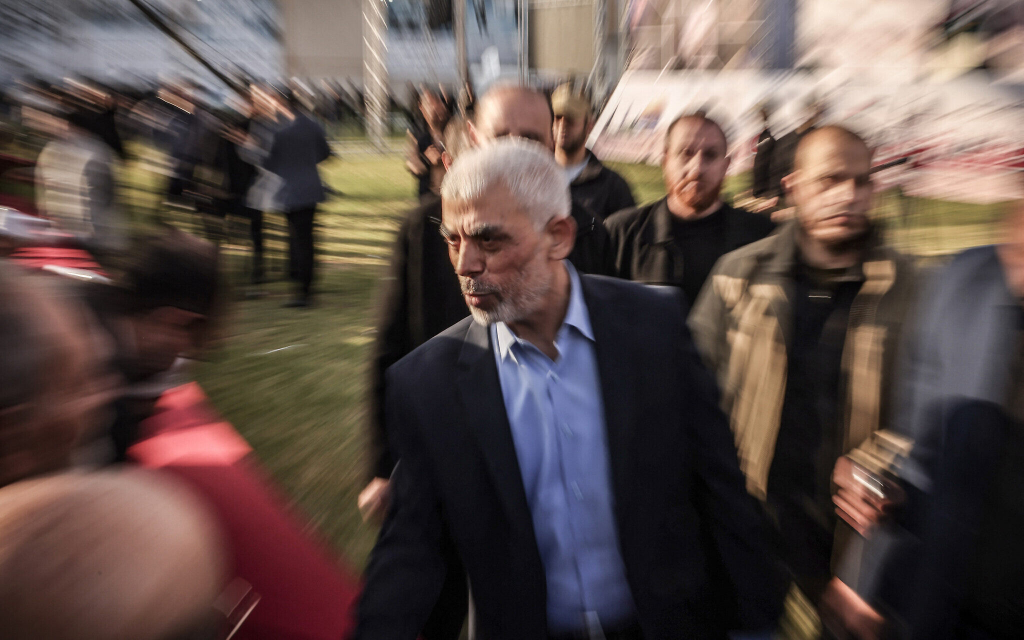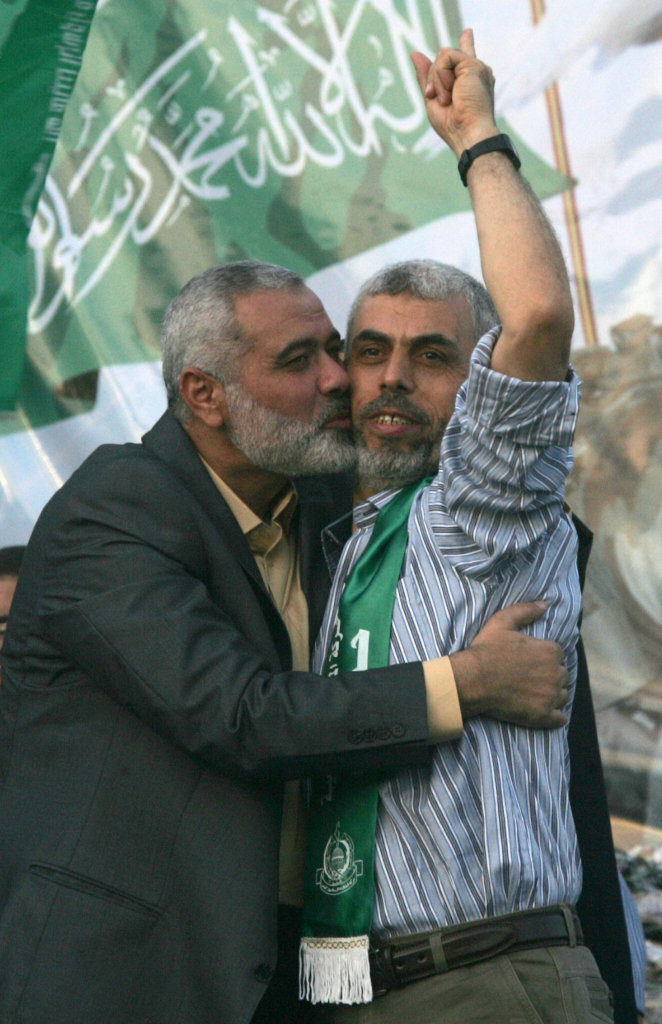IDF spokesman repeats vow to kill Palestinian terror leader; Israeli analyst says group’s promotion of Gaza chief ‘returns the formal center of Hamas power’ to the Strip

The Hamas terror group on Tuesday named Yahya Sinwar as the new head of its “political bureau,” the highest-ranking position in the organization, following the assassination of Ismail Haniyeh in Tehran last week.
The leader of Hamas in Gaza since 2017, Sinwar is widely considered the architect of the October 7, 2023, invasion and massacre in southern Israel, in which thousands of Hamas-led terrorists killed some 1,200 people and took 251 hostage, sparking the ongoing war in Gaza. It is believed that 111 of the hostages abducted on October 7 remain in Gaza, including the bodies of 39 confirmed dead by the IDF. Hamas avowedly seeks to destroy Israel.
Sinwar was selected by Hamas’s 50-strong Shura Council, a consultative body composed of officials elected by Hamas members in four chapters: Gaza, the West Bank, the diaspora and security prisoners in Israeli jails.
Israeli officials believe that Sinwar has been forced to hunker down in Hamas’s vast network of tunnels beneath Gaza since the slaughter he planned and orchestrated 10 months ago. They have indicated he is likely in tunnels under Khan Younis or Rafah, possibly surrounded by hostages.
After October 7, an IDF spokesman, Richard Hecht, called Sinwar the “face of evil” and declared him a “dead man walking.”
In February, the IDF published a video, filmed on October 10, said to show Sinwar walking through a Gaza tunnel with several of his family members.
“The hunt for Sinwar will not stop until we catch him, dead or alive,” IDF Spokesman Daniel Hagaeri said in a press conference upon releasing the footage.

Asked about the Hamas announcement in an interview with the Saudi-based Al Arabiya news channel on Tuesday, Hagari said, “There is only one place for Yahya Sinwar and that is next to Muhammad Deif and all the terrorists who are responsible for October 7. This is the only place we are preparing and designating for him.”
The IDF confirmed on August 1 that it had killed Deif, the commander of Hamas’s military wing, in an airstrike in southern Gaza last month. Hamas has not confirmed his death.

Foreign Minister Israel Katz echoed Hagari’s comments, releasing a statement that said Hamas’s decision was “yet another compelling reason to swiftly eliminate him and wipe this vile organization off the face of the earth.”
In the US, Secretary of State Antony Blinken said Sinwar was still the key figure needed to sign off on talks toward a possible ceasefire and hostage swap in Gaza, after months of negotiations.
“He has been and remains the primary decider when it comes to concluding a ceasefire. And so I think this only underscores the fact that it is really on him to decide whether to move forward with a ceasefire that manifestly will help so many Palestinians in desperate need,” he said.
Speaking to Al-Jazeera television after the announcement, Hamas spokesman Osama Hamdan said Sinwar would continue to be involved in negotiations.
“The problem in negotiations is not the change in Hamas,” he said, blaming Israel and its ally the United States for the failure to seal a deal.
But he said Sinwar’s selection was a sign the group’s will had not been broken. Hamas “remains steadfast in the battlefield and in politics,” he said. “The person leading today is the one who led the fighting for more than 305 days and is still steadfast in the field.”
A senior Hamas official told AFP after the announcement that the selection of Sinwar as Hamas’s political bureau chief sends a “strong message” to Israel. The choice is “a strong message to the occupation (Israel) that Hamas continues its path of resistance,” the official said.
Hamas’ allies Iran and Hezbollah issued statements praising Sinwar’s appointment.
Hamas’ representative in Iran, Khaled Kaddoumi, called Sinwar a “consensus choice” popular among all factions and involved in the group’s decision-making throughout, including in negotiations.
In a voice message to the AP, he said Sinwar knows the political aspirations of the Palestinians for a state and the return of refugees but he is also a “fierce fighter on the battlefield.”
Jibril Rajoub, secretary of the Central Committee of the rival Fatah movement that runs the Palestinian Authority in the occupied West Bank, said the decision was “logical and expected.”
The White House declined to comment on Sinwar’s appointment. But a person familiar with Washington’s thinking said the selection suggested that Hamas could toughen its position in ceasefire negotiations and make it harder to reach a deal.
They added, however, that Israel was already aware that even before his formal appointment Sinwar would have the final word on any agreement to halt the fighting, and the announcement merely set the seal on that.
Sinwar “is now the most powerful figure in Hamas, formally too,” Palestinian affairs analyst Ohad Hemo noted on Channel 12 news on Tuesday evening. “That was already essentially the case, now it’s official.”
“It’s a show of faith” by the terror group, “whose leadership is rapidly shrinking,” Hemo added, “and it returns the formal center of Hamas power to Gaza,” whereas in recent years much of the official leadership was overseas — including Haniyeh and Khaled Mashaal, both based in Qatar.
“This is happening precisely when Hamas is in its worst shape ever in Gaza,” said Hemo, as the IDF works to destroy its military and governance capabilities. “It’s a highly significant move” by Hamas, “an expression of faith in the man who has been leading it in Gaza and, if I may so, into the abyss.”

Born in the Khan Yunis refugee camp in southern Gaza, Sinwar joined Hamas when Sheikh Ahmad Yassin founded the group around the time the first Palestinian intifada began in 1987.
Sinwar set up the group’s internal security apparatus the following year and went on to head an intelligence unit dedicated to flushing out and mercilessly punishing — sometimes killing — Palestinians accused of providing information to Israel.
According to a transcript of an interrogation with security officials published in Israeli media, Sinwar professed to have strangled an alleged collaborator with a keffiyeh in a Khan Yunis cemetery.
A graduate of the Islamic University in Gaza, he learned perfect Hebrew during his 23 years in Israeli jails.
He was serving four life terms for the killing of two Israeli soldiers, as well as four Palestinians he suspected of cooperating with Israel, when he became the most senior of 1,027 Palestinian security prisoners released in exchange for kidnapped IDF soldier Gilad Shalit in 2011.
He had received life-saving brain surgery while he was a prisoner, as recounted by the dentist who identified the tumor in a New York Times article in May.
Sinwar later became a senior commander in the military wing of Hamas, before taking overall leadership of the movement in Gaza, succeeding Haniyeh, in 2017.

Both Hamas and Iran have blamed Israel for the explosion in a Tehran guesthouse that killed Haniyeh early last Wednesday morning.
The Islamic Republic has vowed to retaliate for his killing. Israel has not commented on Haniyeh’s death.

An unsourced report in the Jewish Chronicle published Tuesday claimed that the bomb that killed Haniyeh was planted hours before he was assassinated by two Islamic Revolutionary Guard Corps agents recruited by the Mossad and not weeks or months in advance as previously reported. According to the report, the device was placed under Haniyeh’s bed and detonated remotely by a robot.
As reported by The Times of Israel
